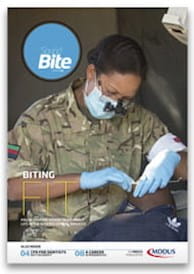COMPETITION for dental jobs is becoming increasingly fierce as the number of graduates looking for training posts continues to rise. Standing out from the crowd is more important than ever – so how can trainees improve their prospects?
One available option is to join a professional organisation. There are a number that are relevant to dentists (including the Faculty of Dental Surgery), but one of the most popular is the Faculty of General Dental Practice (FGDP(UK)).
Formed in 1992, it is part of the Royal College of Surgeons (RCS) and is made up of 21 divisions based across the UK. It looks after the continuing professional development (CPD) training of 5,000 dentists and dental care professionals working in general practice. It also publishes a range of professional standards and guidance documents (available free of charge online to non-members under the Open Standards initiative).
The Faculty advertises itself as being “run by primary care dentists for primary care dentists”, and pledges to “support you throughout your career in general dental practice, from dental school to vocational training and beyond”, adding: “The FGDP(UK) is an organisation that can make a real difference to your career.”
Membership benefits include access to the quarterly Primary Dental Journal, and online resources including the RCS Athens learning portal. Training courses (with member discounts of up to £1,000) are varied, from short masterclasses in periodontics or facial aesthetics, to two year postgraduate diplomas in implant dentistry or restorative dentistry.
There are learning and networking opportunities at local and national events – most Faculty divisions run CPD events with guest speakers, as well as study days and conferences in larger areas.
The Faculty also campaigns on behalf of members, seeking to influence developments in primary care dental regulation, standards and policy.
How to join
Dental students in their fourth and fifth years of study are eligible to join the Faculty for free as an e-ssociate member. Charges vary for others depending on date of qualification and postgraduate qualifications. For example, associate membership – open to registered dentists within three years of graduation – costs £83. “Associate +3” membership – for dentists qualified at least three years who do not hold an approved postgraduate diploma – costs £218.
There are a number of routes to full membership but the most common is by passing the Membership of the Joint Dental Faculties (MJDF). More than 1,800 people sat the exam in 2014 and those who pass can use the letters MJDF after their name.
The Faculty states: “The MJDF is the only examination of its type that recognises that the vast majority of dentistry takes place in the primary care setting, and examines you on the skills and knowledge you actually use in practice. Some skills that bridge the divide between primary and secondary care are also tested, making the MJDF a good stepping stone towards specialism. Wherever your career takes you, the MJDF is a relevant test of your skills and knowledge.
“With the letters MJDF after your name, you are able to demonstrate that you have passed an internationally recognised examination of your competence in practice.”
The exam consists of two parts at locations throughout the UK and internationally, although the primary venues are Leeds and London. Part one consists of a three-hour written exam while part two is a more practical objective structured clinical examination (OSCE) to assess competence and application of knowledge, alongside a structured clinical reasoning component assessing communication skills and application of knowledge.
Sittings are held annually: part one is at the end of March/April (costing £522) and part two (£660) is held end of May/June and late November. There is an extra £50 charge for the submission of a portfolio evidencing skills in five core clinical and professional areas, clinical audit, a CPD log, personal development plan and an up-to-date CV.
Those who pass the MJDF can opt to become a member of the Royal College of Surgeons and its two dental faculties. FGDP members can therefore access advice and support on primary care dentistry as well as support on entering and practising in secondary care from the Faculty of Dental Surgery.
Highest standards
West Midlands dentist Kaushik Paul passed the MJDF exam and is now an MJDF tutor as well as the FGDP(UK) representative on the Advisory Board for Foundation Training in the UK.
He praised the Faculty, saying: “Being part of the FGDP(UK) has allowed me to strive for excellence and quality, attributes that give me great personal satisfaction and my patients the surety of the very highest standards of practice.
“The Faculty has allowed me to meet fellow colleagues through its divisional meetings, and to share ideas and thoughts. But it was the ability to contribute back to the profession that made it even more special.”
The Faculty has noted other positive feedback from members. London dentist Reena Wadia said: “Divisional study days offer a great opportunity to listen to the experts and network with like-minded dental professionals.” Fellow London clinician Radhika Chopra summed up her experience by saying: “If you are looking to progress in your career, the FGDP(UK) will be your helping hand.”
For more information, visit the FGDP website at: www.fgdp.org.uk
This page was correct at the time of publication. Any guidance is intended as general guidance for members only. If you are a member and need specific advice relating to your own circumstances, please contact one of our advisers.
Read more from this issue of Insight Primary

Save this article
Save this article to a list of favourite articles which members can access in their account.
Save to library